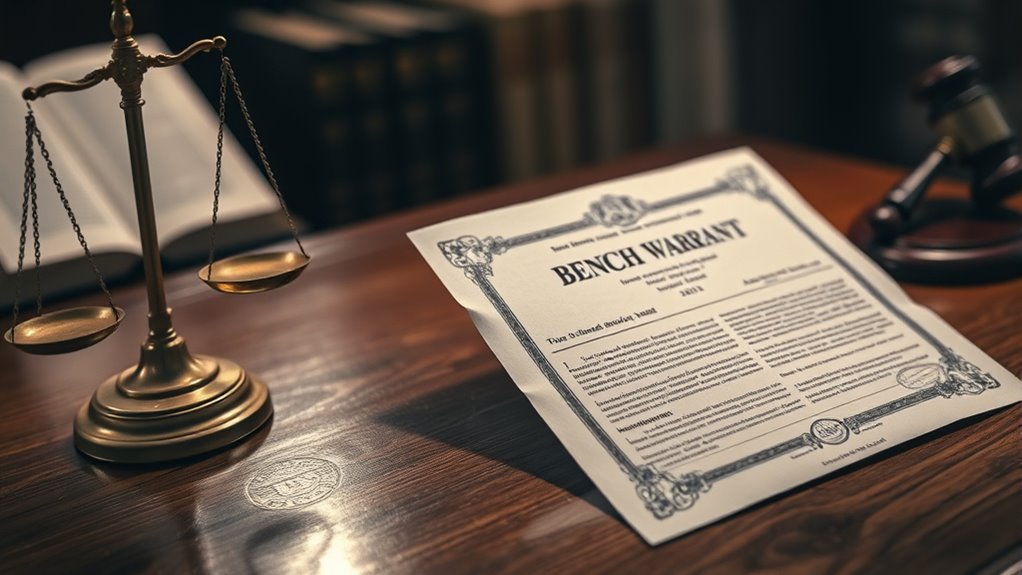Many people believe that bench warrants always mean immediate jail time or that they indicate guilt, but that’s not true. These warrants are often issued to enforce court obligations like unpaid fines or missed appearances and don’t automatically lead to incarceration. In fact, you can often resolve them without being arrested by working with the court or a lawyer. To clear up common myths and learn how to handle such situations, keep exploring this topic.
Key Takeaways
- Bench warrants are issued for missed court obligations, not necessarily indicating guilt or criminal activity.
- Arrests related to warrants often happen during routine stops, not immediately after the warrant is issued.
- Ignoring a bench warrant doesn’t make it disappear; proactive resolution is essential.
- Resolving a warrant usually involves contacting the court, paying fines, or attending hearings, often without arrest.
- Working with legal professionals and understanding procedures can prevent unnecessary incarceration and clarify misconceptions.

Bench warrants often come with a lot of misconceptions, and many people assume the worst without understanding the facts. If you’ve received a notice or are worried about a bench warrant, it’s essential to understand what it really entails. A bench warrant is a court order that authorizes law enforcement to arrest you and bring you before the court. It’s usually issued when you fail to appear for a scheduled court date or don’t comply with legal procedures. Many believe that a bench warrant automatically means you’re a criminal or that you’ll be immediately incarcerated, but that’s not always the case.
A bench warrant is a court order to arrest you for missing a court date or legal obligations.
In reality, a bench warrant is primarily a tool for court enforcement. Its purpose is to ensure that individuals participate in legal proceedings, and it can be issued for various reasons, from missing a court date to failing to pay fines or comply with court orders. When a warrant is issued, law enforcement has the authority to arrest you, but it doesn’t mean immediate jail time. Sometimes, officers might arrest you during a routine traffic stop or when you’re already in custody for another reason. Other times, warrants go unnoticed until you voluntarily address the issue.
Understanding the legal procedures involved can help you navigate the situation better. Once a bench warrant is issued, you typically have options to resolve it. You can contact the court to find out the steps needed to clear the warrant, which may involve paying fines, attending a hearing, or explaining your situation. Ignoring the warrant doesn’t make it disappear; it often leads to more trouble, such as additional charges or increased penalties. It’s better to face the issue directly and work with legal authorities to resolve it.
Many people also believe that once a bench warrant is issued, they can’t do anything until they’re arrested. That’s false. You can proactively address the warrant by consulting a lawyer or going to the court to resolve the matter voluntarily. This proactive step can sometimes prevent a more serious arrest scenario and help you regain control of your legal situation.
In short, a bench warrant is a legal tool used by courts to enforce compliance with legal procedures, not a mark of guilt or a guarantee of jail time. It’s important not to panic or ignore it, but rather to understand your options and act promptly. By doing so, you can resolve the issue more smoothly and avoid unnecessary complications. Remember, court enforcement is about ensuring justice and compliance—knowing your rights and responsibilities makes all the difference. Additionally, understanding court enforcement helps clarify the purpose behind issuing warrants and alleviates unwarranted fears.
Frequently Asked Questions
Can a Bench Warrant Be Canceled Once Issued?
Yes, a bench warrant can be canceled once issued, but it depends on the circumstances. You typically need to follow legal procedures, such as appearing in court or working with an attorney, to request the court to revoke the warrant. Court enforcement plays a role here, as the court assesses your situation and determines if the warrant should be lifted. Acting promptly can help resolve the issue efficiently.
Do All Bench Warrants Lead to Immediate Arrest?
Not all bench warrants lead to immediate arrest. Probable arrest depends on warrant validity and your location. Law enforcement may arrest you right away if they find the warrant valid and there’s a concern for public safety or flight risk. However, some warrants are more of a notice, allowing you to address the issue before arrest. It’s best to resolve the warrant promptly to avoid surprises or unnecessary detention.
How Long Does a Bench Warrant Stay Active?
You might think a bench warrant fades away quickly, but it can stay active indefinitely. Warrant expiration isn’t automatic; it depends on jurisdiction and whether the warrant gets renewed. If you ignore it, it remains valid, lurking in the background. So, don’t assume it expires on its own—stay aware of warrant renewal policies to avoid surprises. Ignorance won’t protect you from a warrant’s long, persistent life.
Can I Resolve a Bench Warrant Without Appearing in Court?
You might wonder if you can resolve a bench warrant without court appearance. Typically, warrant procedures require court notifications and your presence, especially if the warrant involves a missed court date. Sometimes, you can address the issue by contacting the court or filing a motion, but the safest way is to appear in court. This helps you avoid further legal complications and guarantees the warrant gets resolved properly.
Are Bench Warrants Only Related to Criminal Cases?
Think of bench warrants as a shadow lurking over your legal journey—they’re not just for criminal cases. You might be surprised to learn that they also pop up in civil cases and traffic violations, turning simple oversights into serious hurdles. These warrants can turn everyday issues into legal storms, so it’s essential to address them promptly. Ignoring them only fuels the shadow, making it harder to clear your record later.
Conclusion
Don’t let myths about bench warrants keep you scared or uninformed. Nearly 60% of people with bench warrants aren’t even aware of them until they face legal trouble. Knowing the truth can empower you to handle the situation confidently and avoid unnecessary penalties. Remember, understanding your rights and options is your best defense. Stay informed, ask questions, and don’t hesitate to seek legal advice—being proactive can make all the difference.









